The Cambridge History of China. Vol. 12: Republican China, 1912-1949, Part 1
Подождите немного. Документ загружается.

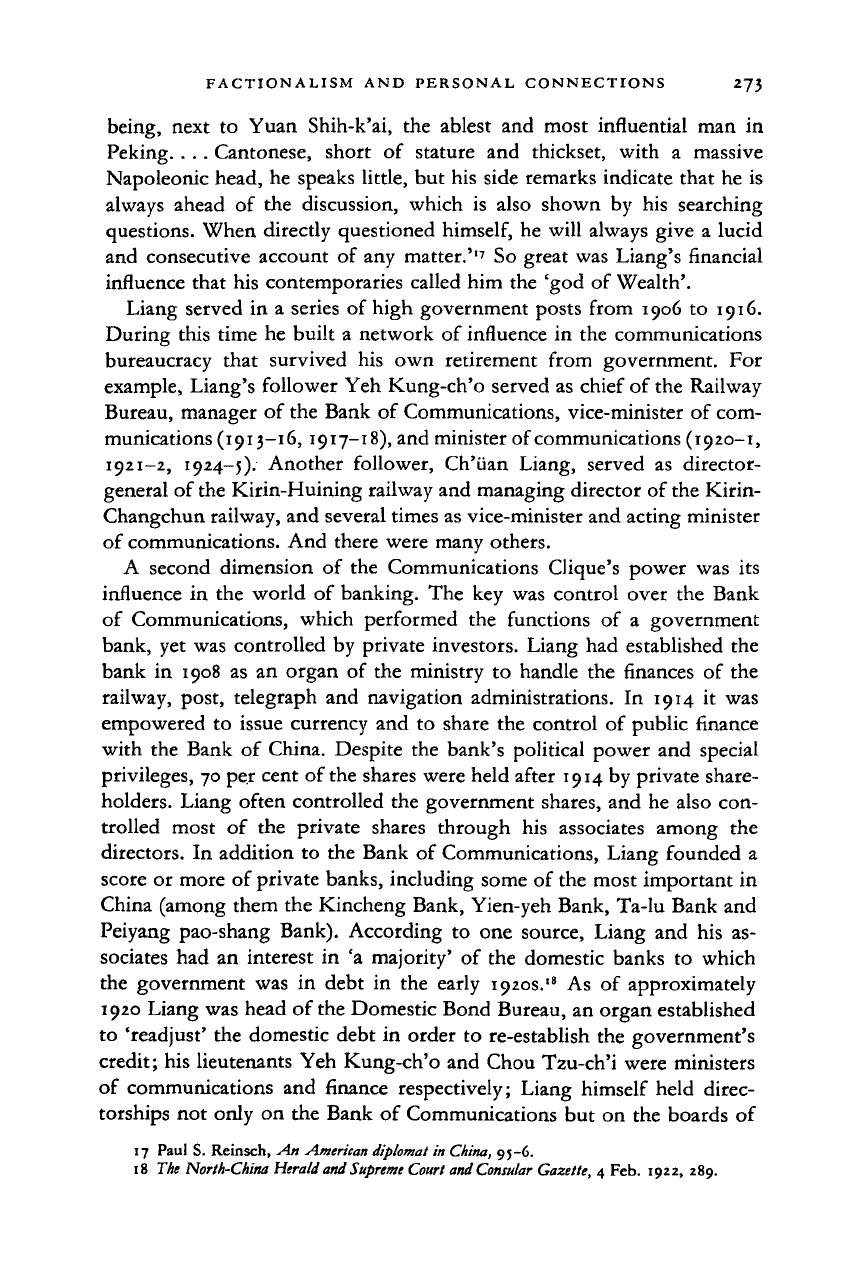
FACTIONALISM AND PERSONAL CONNECTIONS 273
being, next
to
Yuan Shih-k'ai,
the
ablest
and
most influential
man in
Peking.
. . .
Cantonese, short
of
stature
and
thickset, with
a
massive
Napoleonic head,
he
speaks little,
but his
side remarks indicate that
he is
always ahead
of the
discussion, which
is
also shown
by his
searching
questions. When directly questioned
himself,
he
will always give
a
lucid
and consecutive account
of
any matter.'
17
So
great was Liang's financial
influence that his contemporaries called him
the 'god of
Wealth'.
Liang served
in a
series
of
high government posts from 1906
to 1916.
During this time
he
built
a
network
of
influence
in the
communications
bureaucracy that survived
his own
retirement from government.
For
example, Liang's follower Yeh Kung-ch'o served
as
chief
of
the Railway
Bureau, manager
of
the Bank
of
Communications, vice-minister
of
com-
munications (1913-16, 1917-18), and minister of communications
(1920-1,
1921-2,
1924-5). Another follower, Ch'iian Liang, served
as
director-
general
of
the Kirin-Huining railway and managing director
of
the Kirin-
Changchun railway, and several times as vice-minister and acting minister
of communications.
And
there were many others.
A second dimension
of the
Communications Clique's power
was its
influence
in the
world
of
banking.
The key was
control over
the
Bank
of Communications, which performed
the
functions
of a
government
bank,
yet
was controlled
by
private investors. Liang
had
established
the
bank
in 1908 as an
organ
of the
ministry
to
handle
the
finances
of the
railway, post, telegraph
and
navigation administrations.
In
1914
it was
empowered
to
issue currency
and to
share
the
control
of
public finance
with
the
Bank
of
China. Despite
the
bank's political power
and
special
privileges, 70
per
cent
of
the shares were held after 1914
by
private share-
holders. Liang often controlled
the
government shares,
and he
also
con-
trolled most
of the
private shares through
his
associates among
the
directors.
In
addition
to the
Bank
of
Communications, Liang founded
a
score
or
more
of
private banks, including some
of
the most important
in
China (among them
the
Kincheng Bank, Yien-yeh Bank, Ta-lu Bank
and
Peiyang pao-shang Bank). According
to one
source, Liang
and his as-
sociates
had an
interest
in 'a
majority'
of the
domestic banks
to
which
the government
was in
debt
in the
early 1920s.
18
As of
approximately
1920 Liang was head
of
the Domestic Bond Bureau,
an
organ established
to 'readjust'
the
domestic debt
in
order
to
re-establish
the
government's
credit; his lieutenants
Yeh
Kung-ch'o
and
Chou Tzu-ch'i were ministers
of communications
and
finance respectively; Liang himself held direc-
torships
not
only
on the
Bank
of
Communications
but on the
boards
of
17 Paul
S.
Reinsch,
An
American diplomat
in
China, 95-6.
18 The North-China Herald and
Supreme
Court and
Consular
Gazette,
4
Feb. 1922,
289.
Cambridge Histories Online © Cambridge University Press, 2008
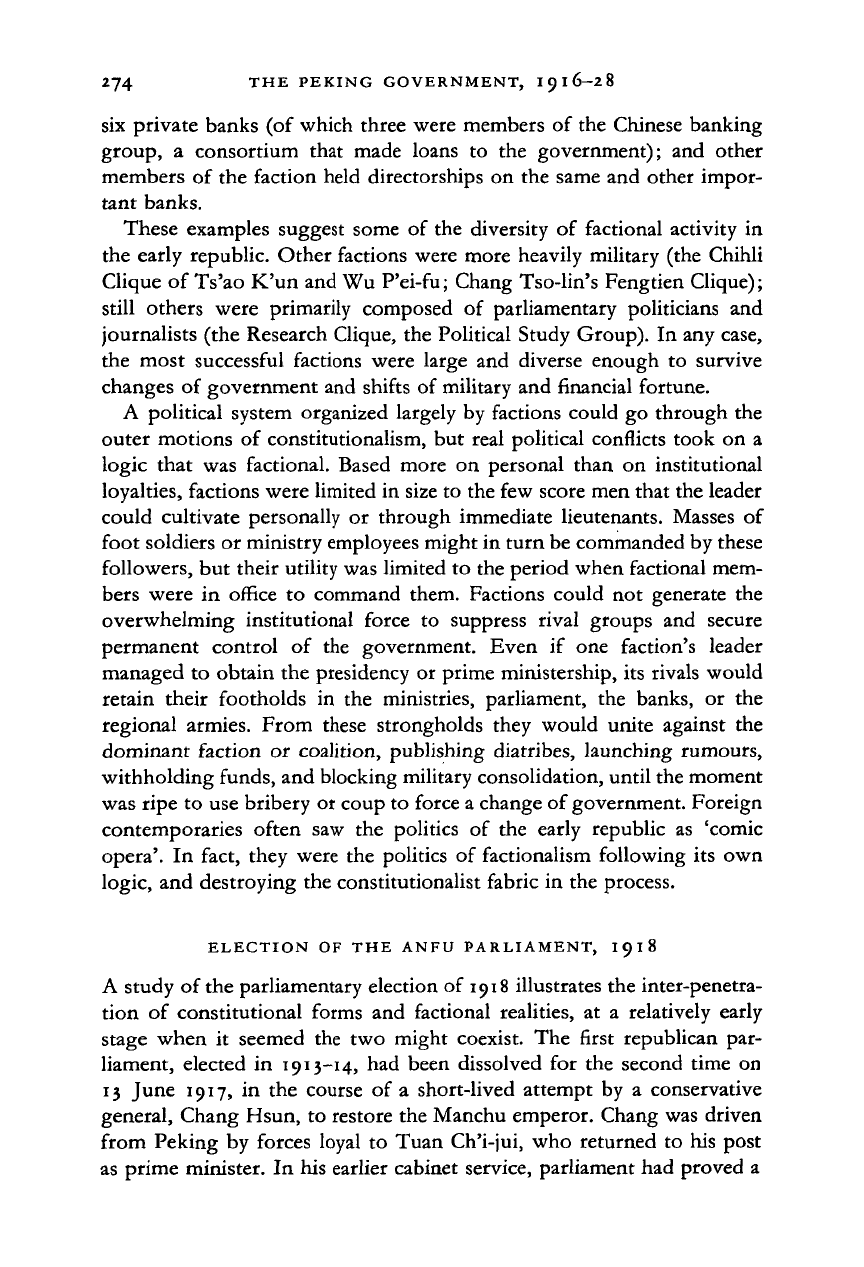
274 THE PEKING GOVERNMENT, I 9 I 6-2 8
six private banks (of which three were members
of
the Chinese banking
group,
a
consortium that made loans
to the
government);
and
other
members
of
the faction held directorships on the same and other impor-
tant banks.
These examples suggest some
of
the diversity
of
factional activity
in
the early republic. Other factions were more heavily military (the Chihli
Clique of Ts'ao K'un and Wu P'ei-fu; Chang Tso-lin's Fengtien Clique);
still others were primarily composed
of
parliamentary politicians
and
journalists (the Research Clique, the Political Study Group). In any case,
the most successful factions were large and diverse enough
to
survive
changes of government and shifts of military and financial fortune.
A political system organized largely by factions could go through the
outer motions
of
constitutionalism, but real political conflicts took on
a
logic that was factional. Based more
on
personal than
on
institutional
loyalties, factions were limited in size to the few score men that the leader
could cultivate personally
or
through immediate lieutenants. Masses
of
foot soldiers or ministry employees might in turn be commanded by these
followers, but their utility was limited to the period when factional mem-
bers were
in
office
to
command them. Factions could not generate the
overwhelming institutional force
to
suppress rival groups
and
secure
permanent control
of the
government. Even
if
one faction's leader
managed to obtain the presidency or prime ministership, its rivals would
retain their footholds
in the
ministries, parliament,
the
banks,
or the
regional armies. From these strongholds they would unite against
the
dominant faction
or
coalition, publishing diatribes, launching rumours,
withholding funds, and blocking military consolidation, until the moment
was ripe to use bribery or coup to force a change of government. Foreign
contemporaries often saw
the
politics
of
the early republic
as
'comic
opera'.
In
fact, they were the politics
of
factionalism following its own
logic,
and destroying the constitutionalist fabric in the process.
ELECTION
OF THE
ANFU PARLIAMENT,
I918
A study of the parliamentary election
of
1918 illustrates the inter-penetra-
tion
of
constitutional forms and factional realities,
at a
relatively early
stage when
it
seemed the two might coexist. The first republican par-
liament, elected
in
1913-14, had been dissolved
for
the second time on
13 June 1917,
in
the course
of a
short-lived attempt
by a
conservative
general, Chang Hsun, to restore the Manchu emperor. Chang was driven
from Peking by forces loyal
to
Tuan Ch'i-jui, who returned
to
his post
as prime minister. In his earlier cabinet service, parliament had proved
a
Cambridge Histories Online © Cambridge University Press, 2008
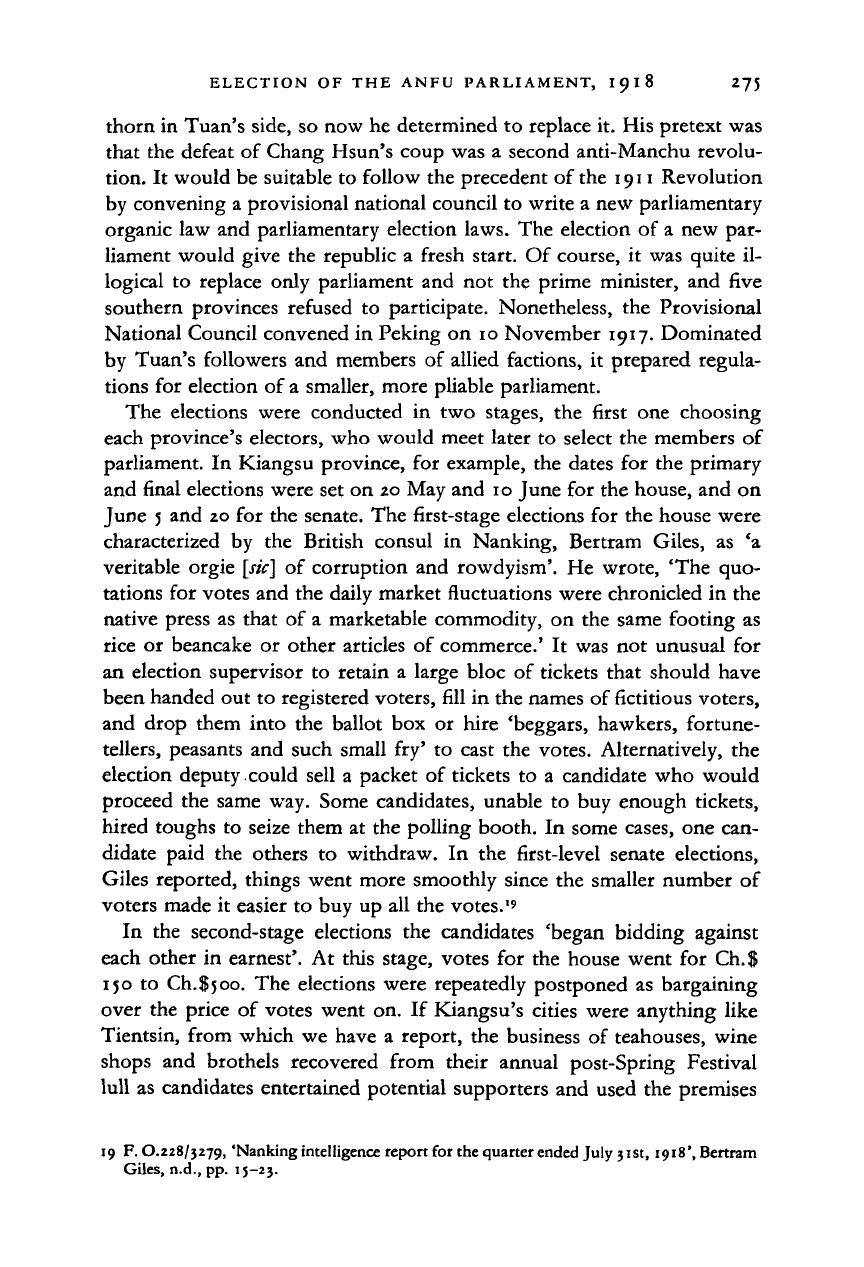
ELECTION
OF THE
ANFU PARLIAMENT,
1918 275
thorn in Tuan's side, so now he determined to replace it. His pretext was
that the defeat of Chang Hsun's coup was a second anti-Manchu revolu-
tion. It would be suitable to follow the precedent of the 1911 Revolution
by convening a provisional national council to write a new parliamentary
organic law and parliamentary election laws. The election of a new par-
liament would give the republic a fresh start. Of course, it was quite il-
logical to replace only parliament and not the prime minister, and five
southern provinces refused to participate. Nonetheless, the Provisional
National Council convened in Peking on 10 November 1917. Dominated
by Tuan's followers and members of allied factions, it prepared regula-
tions for election of a smaller, more pliable parliament.
The elections were conducted in two stages, the first one choosing
each province's electors, who would meet later to select the members of
parliament. In Kiangsu province, for example, the dates for the primary
and final elections were set on 20 May and 10 June for the house, and on
June
5
and 20 for the senate. The first-stage elections for the house were
characterized by the British consul in Nanking, Bertram Giles, as 'a
veritable orgie
[sic]
of corruption and rowdyism'. He wrote, 'The quo-
tations for votes and the daily market fluctuations were chronicled in the
native press as that of a marketable commodity, on the same footing as
rice or beancake or other articles of commerce.' It was not unusual for
an election supervisor to retain a large bloc of tickets that should have
been handed out to registered voters, fill in the names of fictitious voters,
and drop them into the ballot box or hire 'beggars, hawkers, fortune-
tellers, peasants and such small fry' to cast the votes. Alternatively, the
election deputy could sell a packet of tickets to a candidate who would
proceed the same way. Some candidates, unable to buy enough tickets,
hired toughs to seize them at the polling booth. In some cases, one can-
didate paid the others to withdraw. In the first-level senate elections,
Giles reported, things went more smoothly since the smaller number of
voters made it easier to buy up all the votes.'
9
In the second-stage elections the candidates 'began bidding against
each other in earnest'. At this stage, votes for the house went for Ch.$
150 to Ch.$joo. The elections were repeatedly postponed as bargaining
over the price of votes went on. If Kiangsu's cities were anything like
Tientsin, from which we have a report, the business of teahouses, wine
shops and brothels recovered from their annual post-Spring Festival
lull as candidates entertained potential supporters and used the premises
19 F. O.228/3279, 'Nanking intelligence report for the quarter ended July 31st, 1918', Bertram
Giles,
n.d., pp. 15-23.
Cambridge Histories Online © Cambridge University Press, 2008
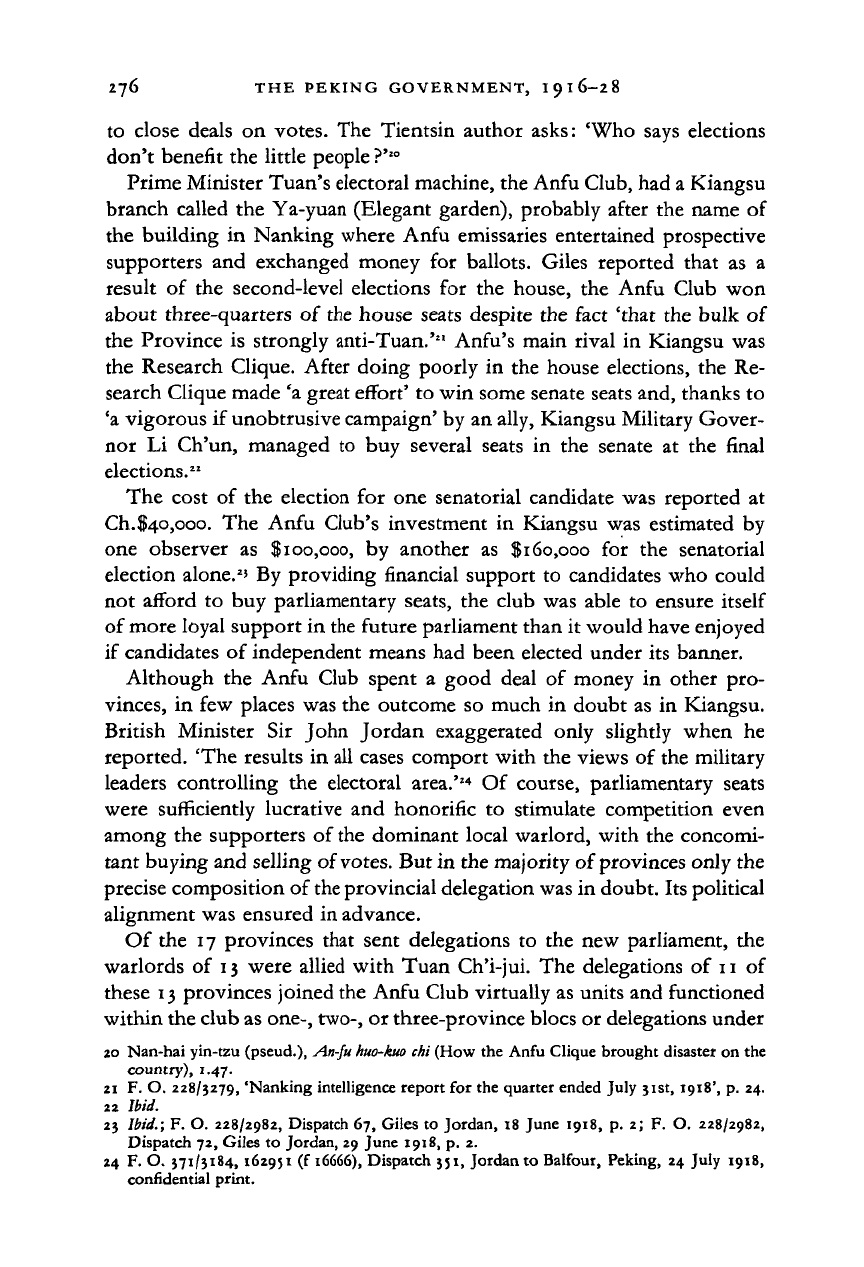
276 THE PEKING GOVERNMENT, I 9 I 6-2 8
to close deals on votes. The Tientsin author asks: 'Who says elections
don't benefit the little people ?'"
Prime Minister Tuan's electoral machine, the Anfu Club, had a Kiangsu
branch called the Ya-yuan (Elegant garden), probably after the name of
the building in Nanking where Anfu emissaries entertained prospective
supporters and exchanged money for ballots. Giles reported that as a
result of the second-level elections for the house, the Anfu Club won
about three-quarters of the house seats despite the fact 'that the bulk of
the Province is strongly anti-Tuan.'
21
Anfu's main rival in Kiangsu was
the Research Clique. After doing poorly in the house elections, the Re-
search Clique made 'a great effort' to win some senate seats and, thanks to
'a vigorous if unobtrusive campaign' by an ally, Kiangsu Military Gover-
nor Li Ch'un, managed to buy several seats in the senate at the final
elections."
The cost of the election for one senatorial candidate was reported at
Ch. 840,000. The Anfu Club's investment in Kiangsu was estimated by
one observer as Si00,000, by another as $160,000 for the senatorial
election alone.
2
' By providing financial support to candidates who could
not afford to buy parliamentary seats, the club was able to ensure itself
of more loyal support in the future parliament than it would have enjoyed
if candidates of independent means had been elected under its banner.
Although the Anfu Club spent a good deal of money in other pro-
vinces, in few places was the outcome so much in doubt as in Kiangsu.
British Minister Sir John Jordan exaggerated only slightly when he
reported. 'The results in all cases comport with the views of the military
leaders controlling the electoral area.'
24
Of course, parliamentary seats
were sufficiently lucrative and honorific to stimulate competition even
among the supporters of the dominant local warlord, with the concomi-
tant buying and selling of
votes.
But in the majority of provinces only the
precise composition of the provincial delegation was in doubt. Its political
alignment was ensured in advance.
Of the 17 provinces that sent delegations to the new parliament, the
warlords of 13 were allied with Tuan Ch'i-jui. The delegations of 11 of
these 13 provinces joined the Anfu Club virtually as units and functioned
within the club as one-, two-, or three-province blocs or delegations under
20 Nan-hai yin-tzu (pseud.), An-fu
huo-kuo
chi (How the Anfu Clique brought disaster on the
country), 1.47.
21 F. O. 228/5279, 'Nanking intelligence report for the quarter ended July 31st, 1918', p. 24.
22
Ibid.
23
Ibid.;
F. O. 228/2982, Dispatch 67, Giles to Jordan, 18 June 1918, p. 2; F. O. 228/2982,
Dispatch 72, Giles to Jordan, 29 June 1918, p. 2.
24 F. O. 371/3184, 162951 (f 16666), Dispatch 351, Jordan to Balfour, Peking, 24 July 1918,
confidential print.
Cambridge Histories Online © Cambridge University Press, 2008
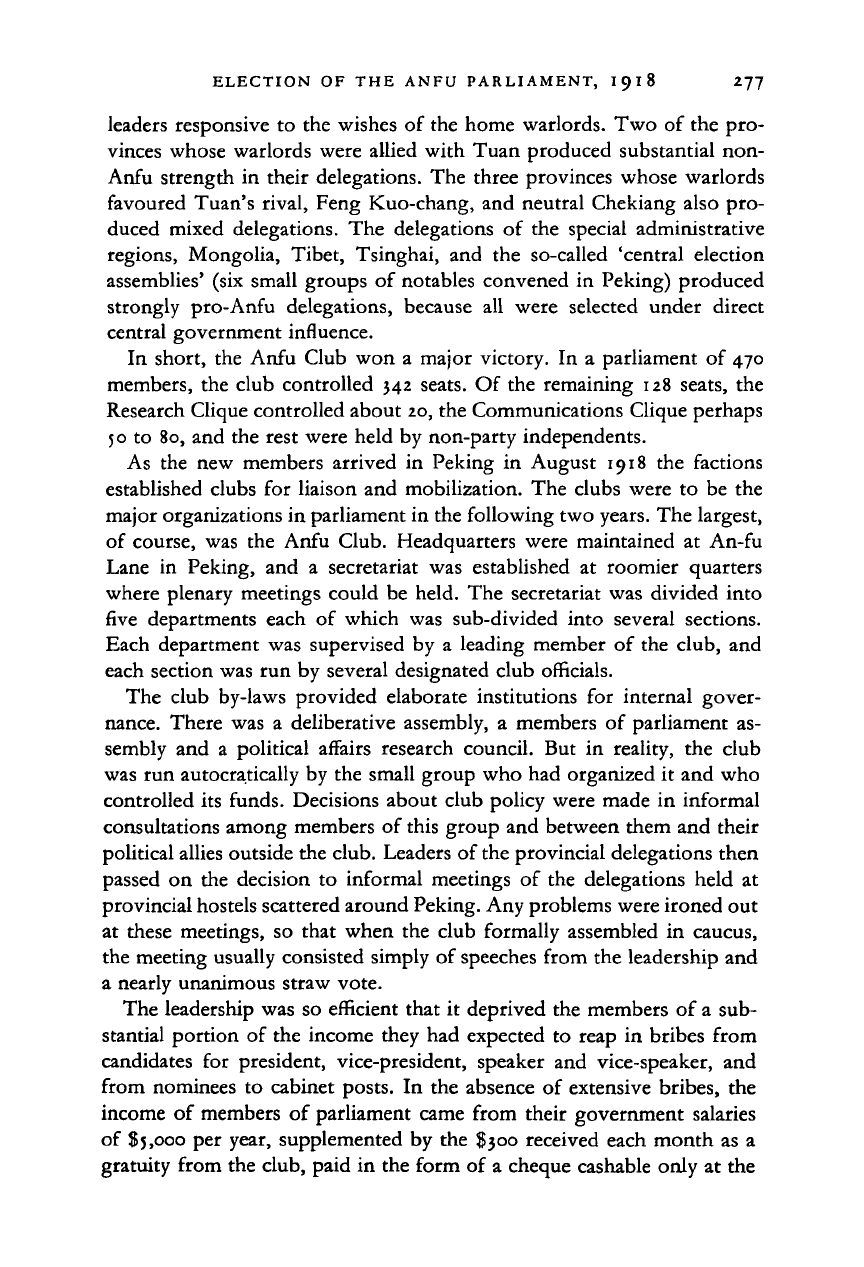
ELECTION
OF THE
ANFU PARLIAMENT,
1918 277
leaders responsive to the wishes of the home warlords. Two of the pro-
vinces whose warlords were allied with Tuan produced substantial non-
Anfu strength in their delegations. The three provinces whose warlords
favoured Tuan's rival, Feng Kuo-chang, and neutral Chekiang also pro-
duced mixed delegations. The delegations of the special administrative
regions, Mongolia, Tibet, Tsinghai, and the so-called 'central election
assemblies' (six small groups of notables convened in Peking) produced
strongly pro-Anfu delegations, because all were selected under direct
central government influence.
In short, the Anfu Club won a major victory. In a parliament of 470
members, the club controlled 342 seats. Of the remaining 128 seats, the
Research Clique controlled about 20, the Communications Clique perhaps
50 to 80, and the rest were held by non-party independents.
As the new members arrived in Peking in August 1918 the factions
established clubs for liaison and mobilization. The clubs were to be the
major organizations in parliament in the following two years. The largest,
of course, was the Anfu Club. Headquarters were maintained at An-fu
Lane in Peking, and a secretariat was established at roomier quarters
where plenary meetings could be held. The secretariat was divided into
five departments each of which was sub-divided into several sections.
Each department was supervised by a leading member of the club, and
each section was run by several designated club officials.
The club by-laws provided elaborate institutions for internal gover-
nance. There was a deliberative assembly, a members of parliament as-
sembly and a political affairs research council. But in reality, the club
was run autocratically by the small group who had organized it and who
controlled its funds. Decisions about club policy were made in informal
consultations among members of this group and between them and their
political allies outside the club. Leaders of the provincial delegations then
passed on the decision to informal meetings of the delegations held at
provincial hostels scattered around Peking. Any problems were ironed out
at these meetings, so that when the club formally assembled in caucus,
the meeting usually consisted simply of speeches from the leadership and
a nearly unanimous straw vote.
The leadership was so efficient that it deprived the members of a sub-
stantial portion of the income they had expected to reap in bribes from
candidates for president, vice-president, speaker and vice-speaker, and
from nominees to cabinet posts. In the absence of extensive bribes, the
income of members of parliament came from their government salaries
of $5,000 per year, supplemented by the $300 received each month as a
gratuity from the club, paid in the form of a cheque cashable only at the
Cambridge Histories Online © Cambridge University Press, 2008
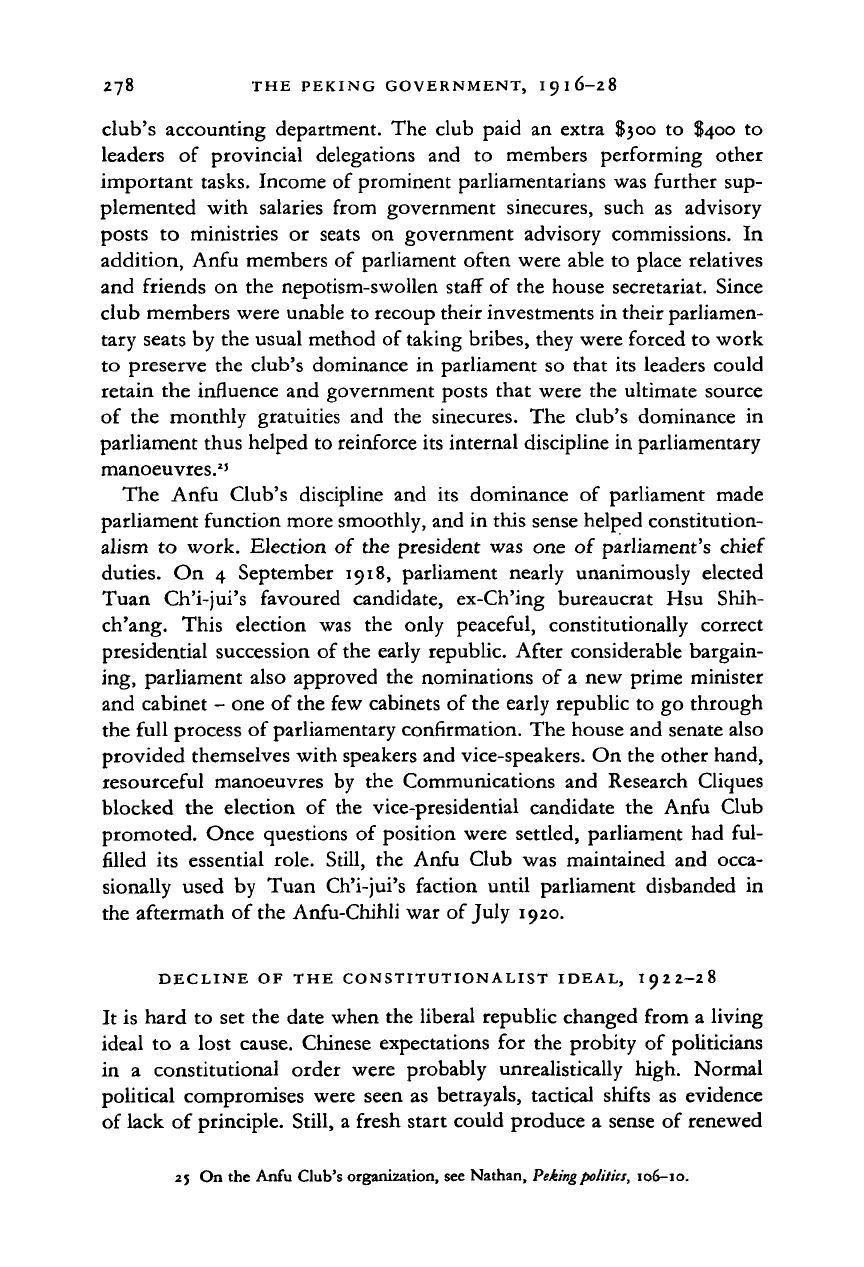
278 THE PEKING GOVERNMENT, I 9 I 6-2 8
club's accounting department. The club paid an extra $300 to 8400 to
leaders of provincial delegations and to members performing other
important tasks. Income of prominent parliamentarians was further sup-
plemented with salaries from government sinecures, such as advisory
posts to ministries or seats on government advisory commissions. In
addition, Anfu members of parliament often were able to place relatives
and friends on the nepotism-swollen staff of the house secretariat. Since
club members were unable to recoup their investments in their parliamen-
tary seats by the usual method of taking bribes, they were forced to work
to preserve the club's dominance in parliament so that its leaders could
retain the influence and government posts that were the ultimate source
of the monthly gratuities and the sinecures. The club's dominance in
parliament thus helped to reinforce its internal discipline in parliamentary
manoeuvres.
2
'
The Anfu Club's discipline and its dominance of parliament made
parliament function more smoothly, and in this sense helped constitution-
alism to work. Election of the president was one of parliament's chief
duties. On 4 September 1918, parliament nearly unanimously elected
Tuan Ch'i-jui's favoured candidate, ex-Ch'ing bureaucrat Hsu Shih-
ch'ang. This election was the only peaceful, constitutionally correct
presidential succession of the early republic. After considerable bargain-
ing, parliament also approved the nominations of a new prime minister
and cabinet - one of the few cabinets of the early republic to go through
the full process of parliamentary confirmation. The house and senate also
provided themselves with speakers and vice-speakers. On the other hand,
resourceful manoeuvres by the Communications and Research Cliques
blocked the election of the vice-presidential candidate the Anfu Club
promoted. Once questions of position were settled, parliament had ful-
filled its essential role. Still, the Anfu Club was maintained and occa-
sionally used by Tuan Ch'i-jui's faction until parliament disbanded in
the aftermath of the Anfu-Chihli war of July 1920.
DECLINE OF THE CONSTITUTIONALIST IDEAL, I 9 2 2-2 8
It is hard to set the date when the liberal republic changed from a living
ideal to a lost cause. Chinese expectations for the probity of politicians
in a constitutional order were probably unrealistically high. Normal
political compromises were seen as betrayals, tactical shifts as evidence
of lack of principle. Still, a fresh start could produce a sense of renewed
25 On the Anfu Club's organization, see Nathan,
Peking
politics, 106-10.
Cambridge Histories Online © Cambridge University Press, 2008
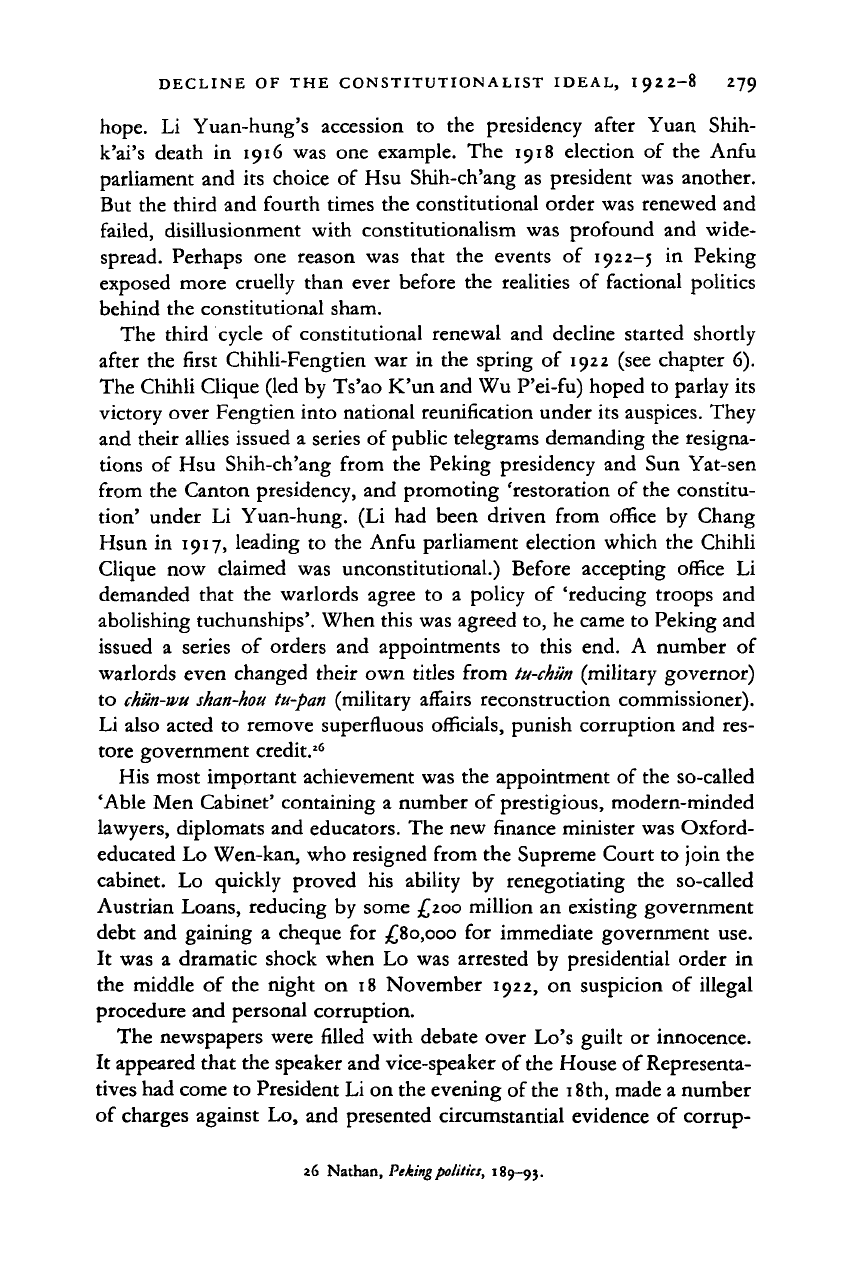
DECLINE OF THE CONSTITUTIONALIST IDEAL, I922-8 279
hope. Li Yuan-hung's accession to the presidency after Yuan Shih-
k'ai's death in 1916 was one example. The 1918 election of the Anfu
parliament and its choice of Hsu Shih-ch'ang as president was another.
But the third and fourth times the constitutional order was renewed and
failed, disillusionment with constitutionalism was profound and wide-
spread. Perhaps one reason was that the events of 1922-5 in Peking
exposed more cruelly than ever before the realities of factional politics
behind the constitutional sham.
The third cycle of constitutional renewal and decline started shortly
after the first Chihli-Fengtien war in the spring of 1922 (see chapter 6).
The Chihli Clique (led by Ts'ao K'un and Wu P'ei-fu) hoped to parlay its
victory over Fengtien into national reunification under its auspices. They
and their allies issued a series of public telegrams demanding the resigna-
tions of Hsu Shih-ch'ang from the Peking presidency and Sun Yat-sen
from the Canton presidency, and promoting 'restoration of the constitu-
tion' under Li Yuan-hung. (Li had been driven from office by Chang
Hsun in 1917, leading to the Anfu parliament election which the Chihli
Clique now claimed was unconstitutional.) Before accepting office Li
demanded that the warlords agree to a policy of 'reducing troops and
abolishing tuchunships'. When this was agreed to, he came to Peking and
issued a series of orders and appointments to this end. A number of
warlords even changed their own titles from
tu-chiin
(military governor)
to
chiin-wu shan-hou tu-pan
(military affairs reconstruction commissioner).
Li also acted to remove superfluous officials, punish corruption and res-
tore government credit.
26
His most important achievement was the appointment of the so-called
'Able Men Cabinet' containing a number of prestigious, modern-minded
lawyers, diplomats and educators. The new finance minister was Oxford-
educated Lo Wen-kan, who resigned from the Supreme Court to join the
cabinet. Lo quickly proved his ability by renegotiating the so-called
Austrian Loans, reducing by some £200 million an existing government
debt and gaining a cheque for £80,000 for immediate government use.
It was a dramatic shock when Lo was arrested by presidential order in
the middle of the night on 18 November 1922, on suspicion of illegal
procedure and personal corruption.
The newspapers were filled with debate over Lo's guilt or innocence.
It appeared that the speaker and vice-speaker of the House of Representa-
tives had come to President Li on the evening of the 18 th, made a number
of charges against Lo, and presented circumstantial evidence of corrup-
z6 Nathan,
Peking
politics,
189-93.
Cambridge Histories Online © Cambridge University Press, 2008
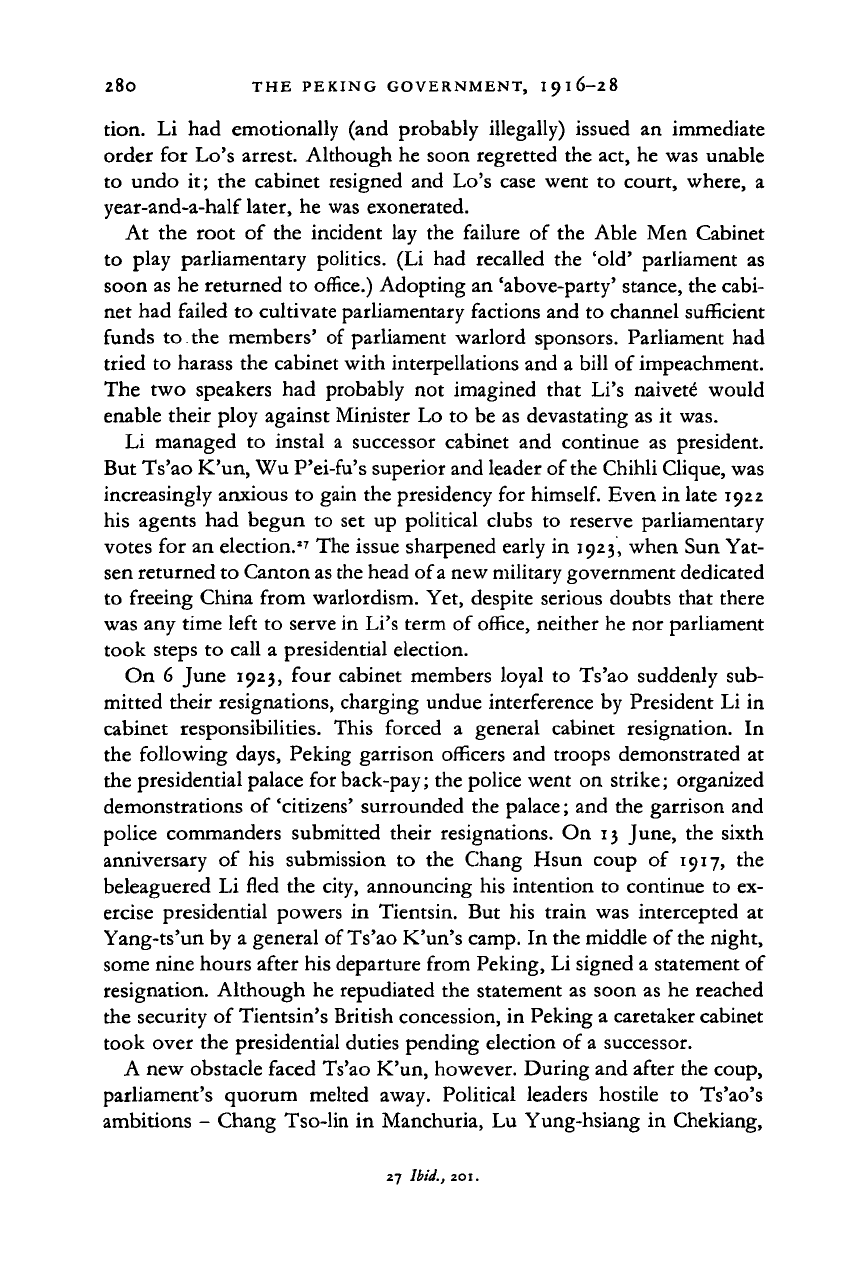
28O THE PEKING GOVERNMENT, I 9 I 6-2 8
tion. Li had emotionally (and probably illegally) issued an immediate
order for Lo's arrest. Although he soon regretted the act, he was unable
to undo it; the cabinet resigned and Lo's case went to court, where, a
year-and-a-half later, he was exonerated.
At the root of the incident lay the failure of the Able Men Cabinet
to play parliamentary politics. (Li had recalled the 'old' parliament as
soon as he returned to office.) Adopting an 'above-party' stance, the cabi-
net had failed to cultivate parliamentary factions and to channel sufficient
funds to the members' of parliament warlord sponsors. Parliament had
tried to harass the cabinet with interpellations and a bill of impeachment.
The two speakers had probably not imagined that Li's naivete would
enable their ploy against Minister Lo to be as devastating as it was.
Li managed to instal a successor cabinet and continue as president.
But Ts'ao K'un, Wu P'ei-fu's superior and leader of
the
Chihli Clique, was
increasingly anxious to gain the presidency for
himself.
Even in late 1922
his agents had begun to set up political clubs to reserve parliamentary
votes for an election.
27
The issue sharpened early in 1923, when Sun Yat-
sen returned to Canton as the head of a new military government dedicated
to freeing China from warlordism. Yet, despite serious doubts that there
was any time left to serve in Li's term of office, neither he nor parliament
took steps to call a presidential election.
On 6 June 1923, four cabinet members loyal to Ts'ao suddenly sub-
mitted their resignations, charging undue interference by President Li in
cabinet responsibilities. This forced a general cabinet resignation. In
the following days, Peking garrison officers and troops demonstrated at
the presidential palace for back-pay; the police went on strike; organized
demonstrations of 'citizens' surrounded the palace; and the garrison and
police commanders submitted their resignations. On 13 June, the sixth
anniversary of his submission to the Chang Hsun coup of 1917, the
beleaguered Li fled the city, announcing his intention to continue to ex-
ercise presidential powers in Tientsin. But his train was intercepted at
Yang-ts'un by a general of Ts'ao K'un's camp. In the middle of the night,
some nine hours after his departure from Peking, Li signed a statement of
resignation. Although he repudiated the statement as soon as he reached
the security of Tientsin's British concession, in Peking a caretaker cabinet
took over the presidential duties pending election of a successor.
A new obstacle faced Ts'ao K'un, however. During and after the coup,
parliament's quorum melted away. Political leaders hostile to Ts'ao's
ambitions - Chang Tso-lin in Manchuria, Lu Yung-hsiang in Chekiang,
27
Ibid.,
201.
Cambridge Histories Online © Cambridge University Press, 2008
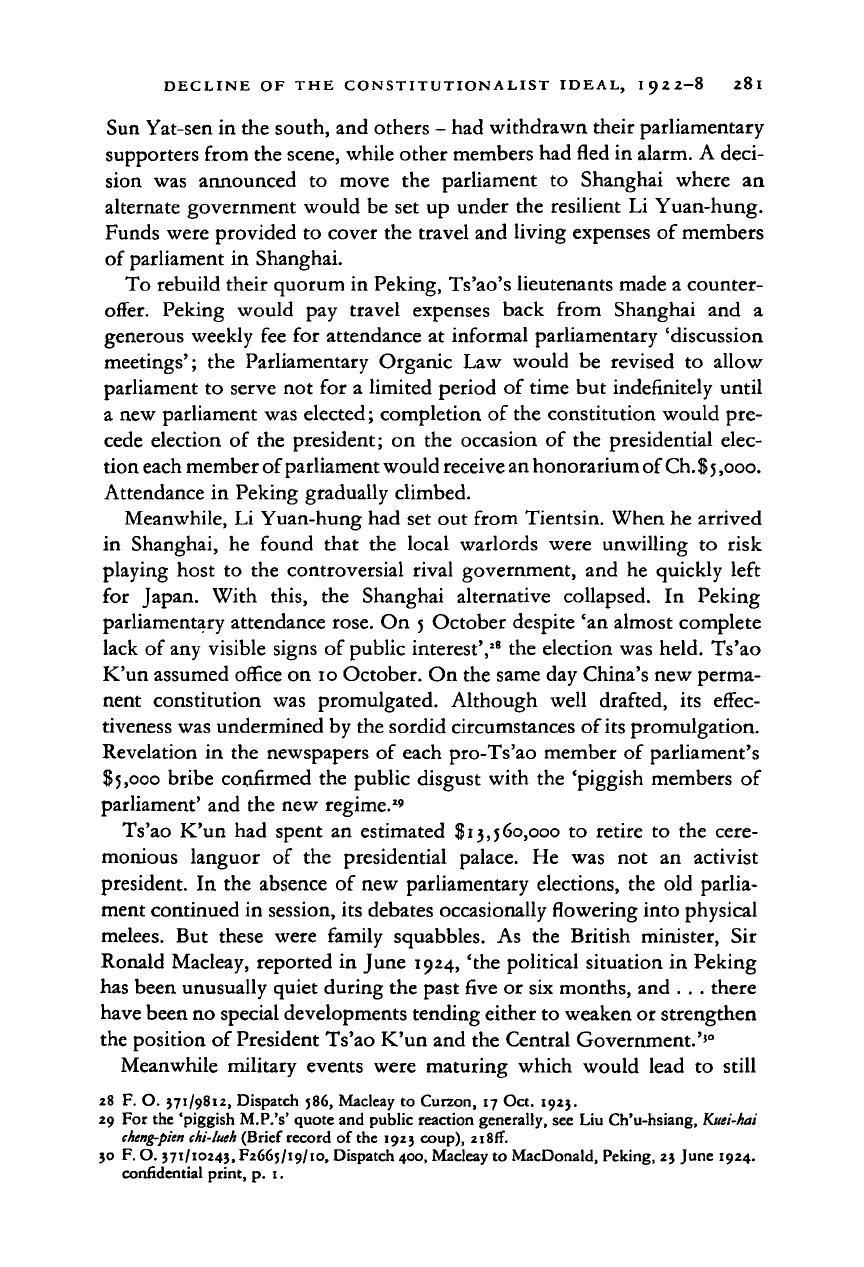
DECLINE OF THE CONSTITUTIONALIST IDEAL, I922-8 281
Sun Yat-sen in the south, and others - had withdrawn their parliamentary
supporters from the scene, while other members had fled in alarm. A deci-
sion was announced to move the parliament to Shanghai where an
alternate government would be set up under the resilient Li Yuan-hung.
Funds were provided to cover the travel and living expenses of members
of parliament in Shanghai.
To rebuild their quorum in Peking, Ts'ao's lieutenants made a counter-
offer. Peking would pay travel expenses back from Shanghai and a
generous weekly fee for attendance at informal parliamentary 'discussion
meetings'; the Parliamentary Organic Law would be revised to allow
parliament to serve not for a limited period of time but indefinitely until
a new parliament was elected; completion of the constitution would pre-
cede election of the president; on the occasion of the presidential elec-
tion each member of parliament would receive an honorarium of Ch. $ 5,000.
Attendance in Peking gradually climbed.
Meanwhile, Li Yuan-hung had set out from Tientsin. When he arrived
in Shanghai, he found that the local warlords were unwilling to risk
playing host to the controversial rival government, and he quickly left
for Japan. With this, the Shanghai alternative collapsed. In Peking
parliamentary attendance rose. On
5
October despite 'an almost complete
lack of any visible signs of public interest',
28
the election was held. Ts'ao
K'un assumed office on 10 October. On the same day China's new perma-
nent constitution was promulgated. Although well drafted, its effec-
tiveness was undermined by the sordid circumstances of
its
promulgation.
Revelation in the newspapers of each pro-Ts'ao member of parliament's
85,000 bribe confirmed the public disgust with the 'piggish members of
parliament' and the new regime.
19
Ts'ao K'un had spent an estimated 813,560,000 to retire to the cere-
monious languor of the presidential palace. He was not an activist
president. In the absence of new parliamentary elections, the old parlia-
ment continued in session, its debates occasionally flowering into physical
melees. But these were family squabbles. As the British minister, Sir
Ronald Macleay, reported in June 1924, 'the political situation in Peking
has been unusually quiet during the past five or six months, and . . . there
have been no special developments tending either to weaken or strengthen
the position of President Ts'ao K'un and the Central Government.'
50
Meanwhile military events were maturing which would lead to still
28 F. O. 571/9812, Dispatch 586, Macleay to Curzon, 17 Oct. 1923.
29 For the 'piggish M.P.V quote and public reaction generally, see Liu Ch'u-hsiang, Kuei-hai
ehtng-pien chi-Iueh
(Brief record of the 1923 coup),
2i8ff.
30 F. O. 371/10243, F2665/19/10, Dispatch 400, Macleay to MacDonald, Peking, 23 June 1924.
confidential print, p. 1.
Cambridge Histories Online © Cambridge University Press, 2008
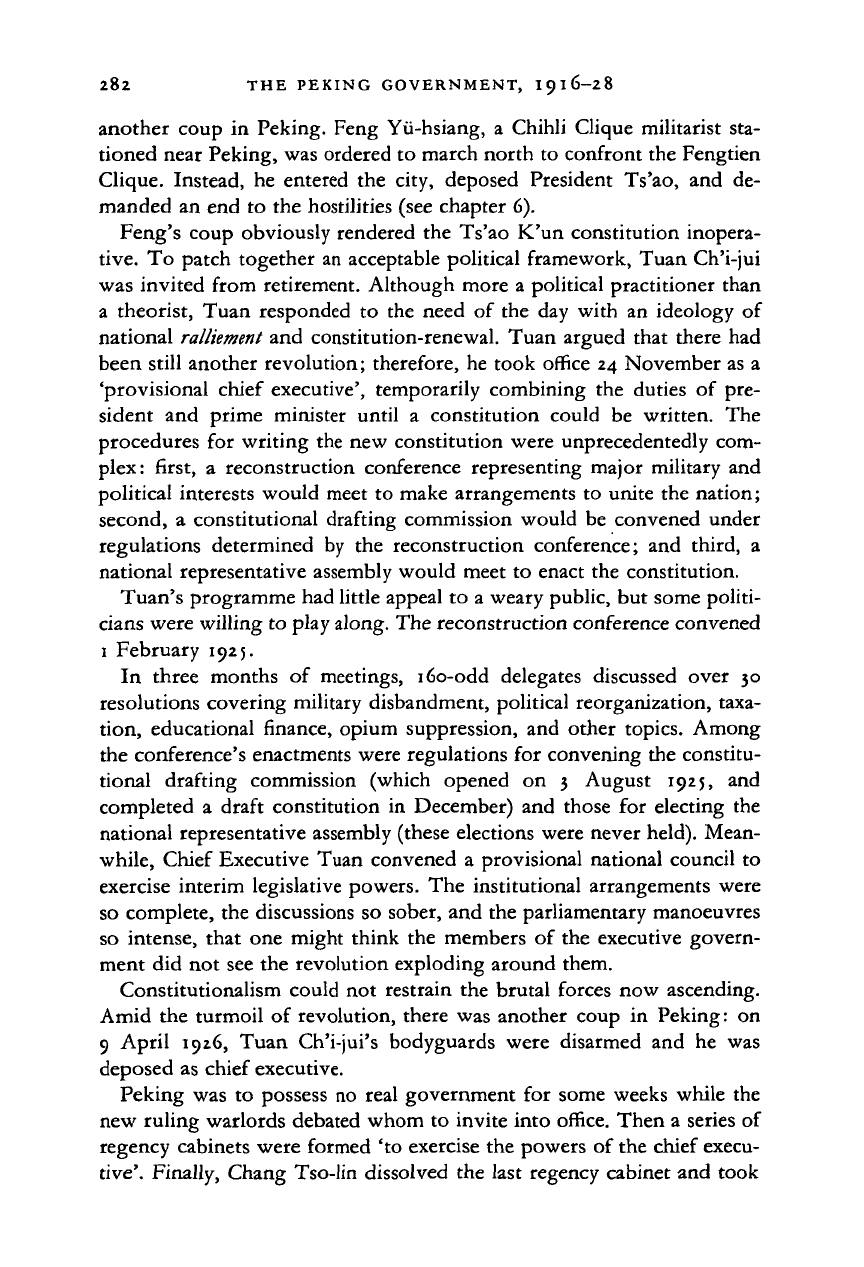
282 THE PEKING GOVERNMENT, I 9 I 6-2 8
another coup in Peking. Feng Yii-hsiang, a Chihli Clique militarist sta-
tioned near Peking, was ordered to march north to confront the Fengtien
Clique. Instead, he entered the city, deposed President Ts'ao, and de-
manded an end to the hostilities (see chapter 6).
Feng's coup obviously rendered the Ts'ao K'un constitution inopera-
tive.
To patch together an acceptable political framework, Tuan Ch'i-jui
was invited from retirement. Although more a political practitioner than
a theorist, Tuan responded to the need of the day with an ideology of
national
ralliement
and constitution-renewal. Tuan argued that there had
been still another revolution; therefore, he took office 24 November as a
'provisional chief executive', temporarily combining the duties of pre-
sident and prime minister until a constitution could be written. The
procedures for writing the new constitution were unprecedentedly com-
plex: first, a reconstruction conference representing major military and
political interests would meet to make arrangements to unite the nation;
second, a constitutional drafting commission would be convened under
regulations determined by the reconstruction conference; and third, a
national representative assembly would meet to enact the constitution.
Tuan's programme had little appeal to a weary public, but some politi-
cians were willing to play along. The reconstruction conference convened
1 February 1925.
In three months of meetings, 160-odd delegates discussed over 30
resolutions covering military disbandment, political reorganization, taxa-
tion, educational finance, opium suppression, and other topics. Among
the conference's enactments were regulations for convening die constitu-
tional drafting commission (which opened on 3 August 1925, and
completed a draft constitution in December) and those for electing the
national representative assembly (these elections were never held). Mean-
while, Chief Executive Tuan convened a provisional national council to
exercise interim legislative powers. The institutional arrangements were
so complete, the discussions so sober, and the parliamentary manoeuvres
so intense, that one might think the members of the executive govern-
ment did not see the revolution exploding around them.
Constitutionalism could not restrain the brutal forces now ascending.
Amid the turmoil of revolution, there was another coup in Peking: on
9 April 1926, Tuan Ch'i-jui's bodyguards were disarmed and he was
deposed as chief executive.
Peking was to possess no real government for some weeks while the
new ruling warlords debated whom to invite into office. Then a series of
regency cabinets were formed 'to exercise the powers of the chief execu-
tive'.
Finally, Chang Tso-lin dissolved the last regency cabinet and took
Cambridge Histories Online © Cambridge University Press, 2008
